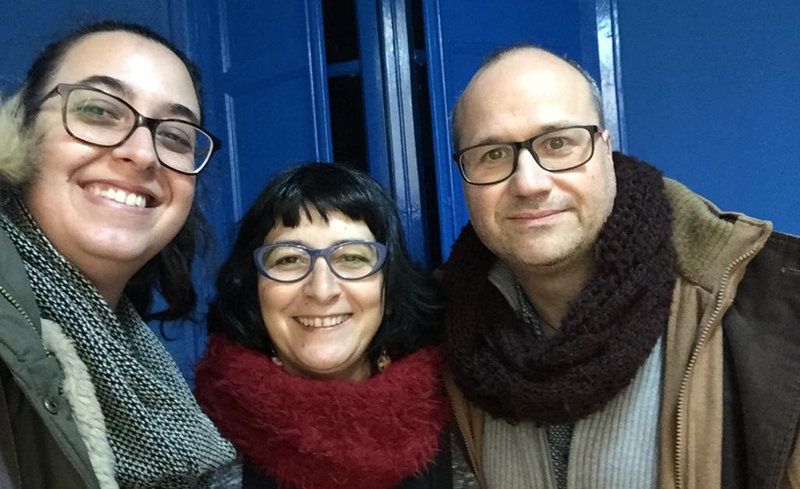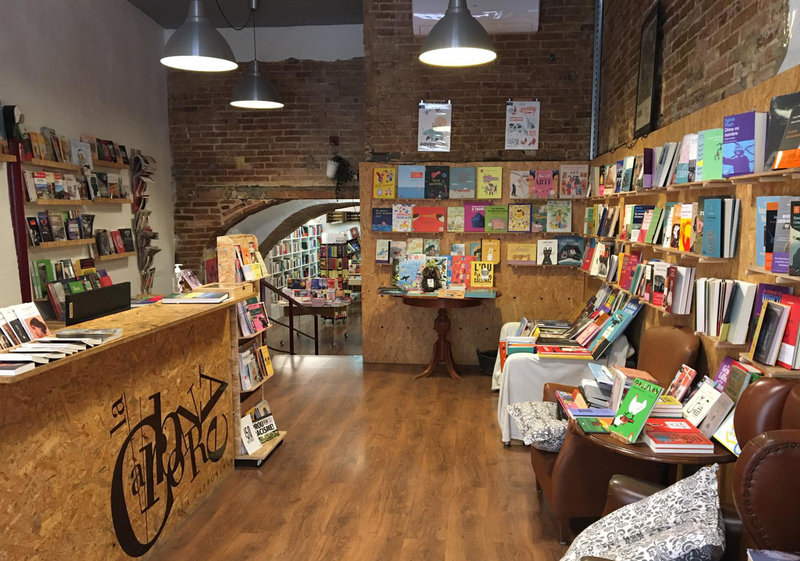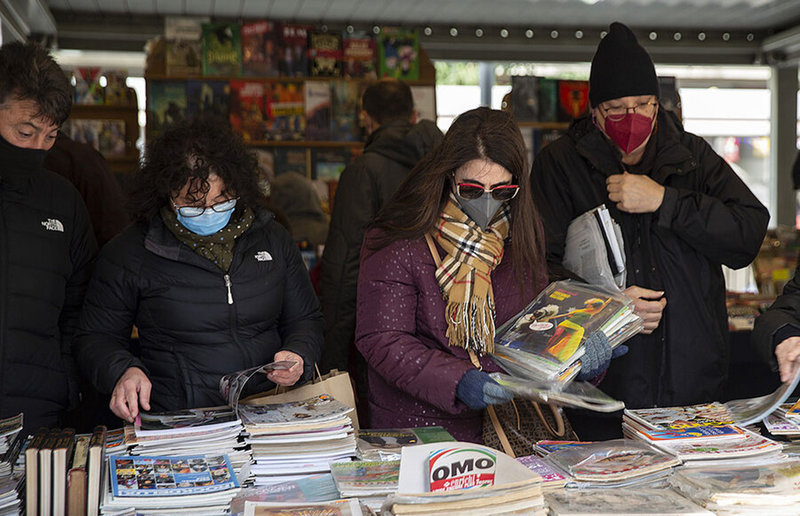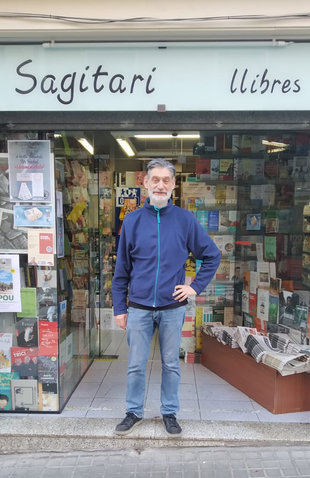Passion, Innovation and Determination
Against all expectations, the pandemic has seen a boom in new bookshops opening. This is also true in Catalonia, where 15 new bookshops have opened in Barcelona alone aiming to make a mark and safeguard reading and culture
“A bookshop is not just a shop where books are sold. A bookshop is a space for strolling through, getting lost in, and for discovery. It’s not a screen, it’s not an algorithm.”
Borja Duñó, Time Out Barcelona, November 8, 2021
“Our work is to sow the reading seed in the very young, so that reading becomes natural and accompanies them all their lives.”
El pati blau, Cornellà
During the pandemic, defying expectations and apparent economic reason, as bars closed, new bookshops opened all over Europe and the US. Like the rise in book-buying, this had started before the pandemic. In 2021, the number of independent bookshops grew for the fifth year running in Britain and Ireland, according to the Booksellers’ Association (BA). Between 1995 and 2016, BA membership dropped from 1,894 to 867, but by the end of 2021 membership had risen back up to 1,027 members. Book-lovers were opening shops, in reaction to the voices of doom. As Meryl Halls, BA managing director, said: “The increase in the number of bookshops in the face of lockdowns, restrictions and supply-chain issues demonstrates the passion, innovation and determination of booksellers.”
In the years following the 2008 economic crisis, some 30 bookshops closed in Catalonia, including big names like Ancora y Delfín, Catalònia, opposite Barcelona’s Corte Inglés, or Robafaves in Mataró. Apart from falling sales, the decisive blow for several Barcelona shops was huge rent hikes in the central areas. Now, over a decade later, the reverse is taking place: during the pandemic, fifteen new shops opened in Barcelona. Many specialise: La Insòlita, a feminist science fiction shop in Poble nou; the formerly itinerant Fahrenheit 451, now at Negra i Criminal’s former premises in Barceloneta; and Terranova, focusing on art, by Sant Antoni market.
The Big Bookshop
There are two models. The first has big capital investment, big premises in a central location and big publicity. The second model is the smaller neighbourhood bookshop, based on long, hard work by dedicated booksellers.
There are three big shops in the fifteen: Ona, on Pau Claris opposite Laie, promoting books in Catalan; Byron, backed by the publisher Huygens, “a dynamic cultural centre,” with a café and multi-use Shelley room in the Eixample; and Finestres at Diputació 249. Finestres is something to behold. It has six sofas, numerous armchairs, wooden shelving and floors, carpets and a fireplace. It has no coverage for mobiles and a rule of silence, with notices that light up if the noise grows – and 45,000 books in many languages. “It is trying to imitate the air of a London club,” the cultural journalist Carles Geli wrote. A dangerous ambition, perhaps, as London clubs are, one hears, full of lazy aristocrats and bankers, mainly men. Finestres is a major investment by the pharmaceutical businessman and cultural patron Sergi Ferrer-Salat. Ona, Byron and Finestres, like Obama’s memoir, make you think that books are not necessarily a ruinous business.
The story of the Costa Brava town Calonge falls between the two categories. Here there is investment (public, not private) and big publicity, but small bookshops. In Calonge’s old quarter, seven bookshops, each on a different theme (comics, oriental, travel, children’s, esoteric, and two generalist) opened on December 10, 2021. The town council had offered tax incentives and chose the seven out of seventy applications. “All Catalans must come here once in their lifetimes,” announced Norbert Botella, the town’s Councillor for Culture. The aims are to revitalise the old quarter as a “Book-Town”, a cool refuge for “all Catalans” and those over-heated tourists on the Sant Antoni de Calonge beaches.
Loyal customers
Sit around in Finestres, but to buy a book, please go to a local shop. La Carbonera (Carrer Blai 40) opened in October 2017, well before the coronavirus pandemic began. The two young partners had done their research: there was no other bookshop in Poble Sec. Their experience is typical of the vast majority of small bookshops that have survived. You have to be active, invite the neighbourhood in. If you just sit behind a cash register and wait for customers, you’re sunk. From the start they made La Carbonera a space for cultural events: their Sunday morning presentations, ‘vermuts literaris’, pulled in crowds. Their dynamism meant that, when the pandemic brought silence to the streets, “Many people were sure they didn’t want us to go under,” Laia of La Carbonera told me. Jaume of Sagitari (Passatge Vila i Rosell, 10, Horta), a generalist bookshop with a radical pro-independence line, said the same: “Our customers showed solidarity with us.”
Laia and her partners are young. I asked them whether young people read. “Of course they do. Young people read a lot, but they read differently. We’re sure cheap paperbacks are going to die out. Young people want an object, a book that’s an object, they’re looking at the outside, not just the contents.” Jaume agreed, but added a nuance: “It’s not true that young people don’t buy books, but it would be desirable that their interest in reading increase.”
The formulae for local bookshops are generally the same. As El pati blau, opened in Cornellà in March 2019, told me: “Having a wide variety of books, treating people well, handling orders rapidly… basically, forming a loyal customer base in the neighbourhood through children’s events, presentations, reading clubs, social media, allowing other groups to use the premises.”
Some shops, not to be named, delivered books by stealth during lockdown.
Resistirem!
Consciousness is growing of the harm done by platform capitalists like Amazon: low wages, exploitative conditions, destruction of local businesses. Several booksellers delight in telling of customers who browse Amazon, then come into the shop with the details and order the book off-line.
Jaume was clear. “Amazon, Amazon, fuck, fuck, fuck. The future needs to expel Amazon, just make it disappear… Disgusting capitalist monster!” The three cooperativists of El pati blau were romantic:
Against Amazon, the human factor is our biggest asset. Bookshops have become meeting-places for the community, refuges to slough off the day’s stress, and small oases where you can find what you’re looking for.
Most neighbourhood booksellers have idealism and a clear sense of vocation. Jaume explained:
“We started out 35 years ago with a romantic, ingenuous perhaps, spirit towards books and their world. We hoped to grow till we could earn a decent living doing what we liked, without suffering. Well, we’re still here, despite suffering, in permanent crisis and without ever reaching a decent income. Però resistirem! We’ll keep fighting.”
books sant jordi’s day
books sant jordi’s day










